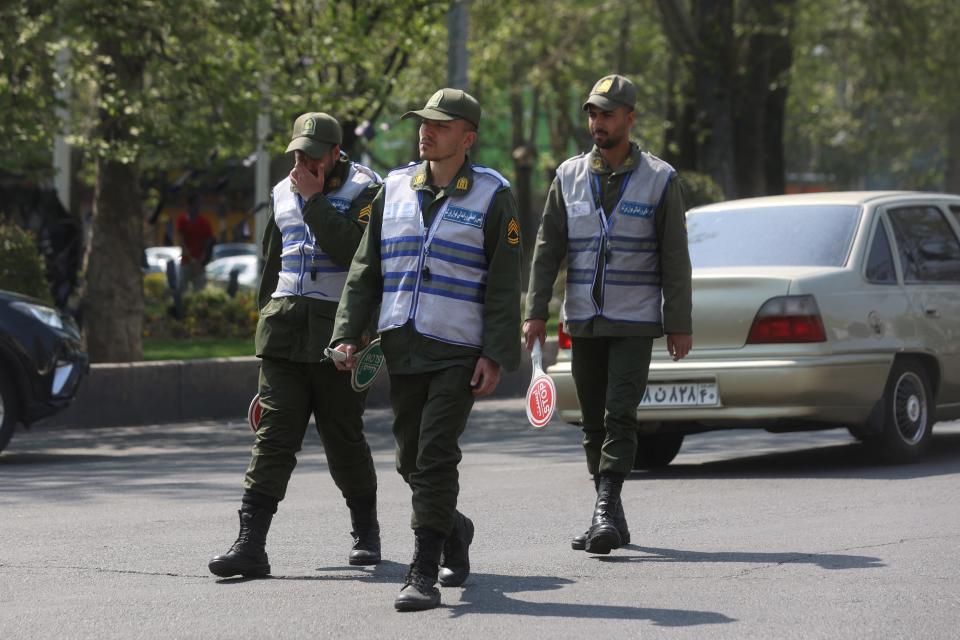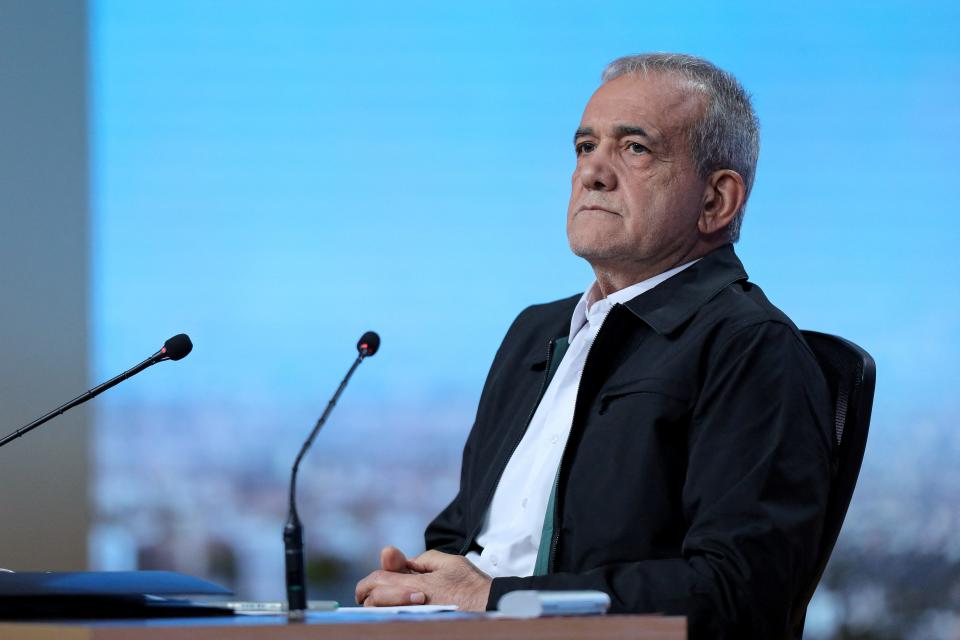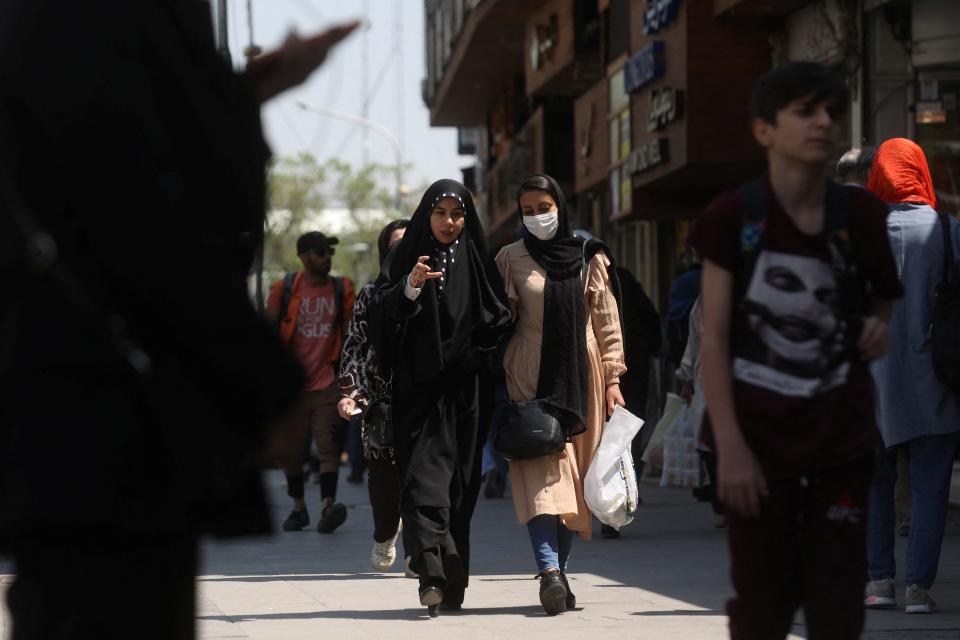Hijab crackdown: Iran presidential candidates are ducking the issue. What does that mean for women?
LONDON − Nearly two years after Iran crushed a wave of women's rights protests, the hijab − the head cover that all women are required to wear in public by 45-year-old morality laws − has become so toxic that conservatives aligned with Supreme Leader Ali Khamenei appear to be dodging the issue.
As a moderate candidate gains ground ahead of Friday's presidential election, conservative politicians in the Islamic Republic are trying to distance themselves from lightning-rod laws forcing women to cover themselves.
The abrupt change shows how the political ground may be shifting following the surprise death last month of President Ebrahim Raisi in a helicopter crash. Faced with a snap election campaign for his successor, some establishment candidates appear to be dodging an issue that's central to Iranian life.
"Even the conservative candidates are arguing against it, distancing themselves not only from the manner in which the protests were suppressed but from the law itself," said Trita Parsi, vice president of the Quincy Institute for Responsible Statecraft. "Even among conservative voters, there is not majority support for imposing the hijab on others," he added.
"The consensus is that it should be a choice."
At least 500 Iranians killed in protests over hijab laws
At least 500 Iranians were killed in 2022 in fearless youth demonstrations after a 22-year-old woman, Mahsa Amini, died violently in police custody following a hijab-related arrest.
More: Iran president 'has blood on his hands': Ebrahim Raisi and Iran's prison massacres
Now, amid a new wave of headscarf arrests, candidates hand-picked by the clerical establishment are running the other way.
"No candidate wanted to affiliate themselves with the renewed hijab crackdown," said Mohammad Ali Shabani, editor of London-based Amwaj Media. "That isn't to say they are opposed to hijab legislation. Rather it indicates how enforcement of the Islamic headscarf, amid campaign season, is a political liability."
"For a state that calls itself Islamic, this is quite striking."
Raisi's fatal helicopter crash and no "Plan B"
Friday's election wasn't part of Khamenei's plan.
Not long ago, conservative hardliners confidently ruled Iran, from the supreme leader on down. The passionate "Woman, Life and Freedom" protests of 2022 had been crushed, and President Raisi, a former prosecutor implicated in mass executions, appeared on track to replace 85-year-old Khamenei.
Then, last month, Raisi was killed when his helicopter smashed into a remote wooded mountainside. The constitution called for a speedy presidential vote.

"The conservatives had everything in place," Parsi said. "Raisi was on a pathway to replace Khamenei. All the pieces were in place − except they had powerfully alienated Iranian society."
No female candidates
Not anyone can run for president in Iran.
Women are out. So are non-Muslims. And non-Shia Muslims. Would-be candidates have to pass muster with the Guardian Council, a body of jurists appointed by Khameni. This year, six made the cut, five of them firm conservatives or hardliners.
More: 'Woman, life, liberty': Iran rights activist Narges Mohammadi wins Nobel Peace Prize
The outlier is Massoud Pezeshkian, a former health minister who was disqualified in 2021. Pezeshkian has criticized enforcement of the headscarf laws without forcefully challenging Khamenei. He is "surging in most of the polls," Parsi said.
After Masha Amini was killed in 2022, Pezeshkian posted his dismay on social media: "In the Islamic Republic, it is unacceptable to arrest a girl for wearing a hijab and then hand over her body to her family...May God have mercy on us and our children..."
Pezeshkian said earlier this month that the new hijab crackdown "is leading us to darkness," IranWire reported.
Why did the clerics allow Pezeshkian to run this year after his earlier disqualification? "It’s not clear if that’s a course correction, or if they didn’t have time for a Plan B" after Raisi’s shocking death, Parsi said.
Now, with the conservative vote split among three candidates − two hardliners, Vice President Ghazizadeh Hashemi and Tehran Mayor Alireza Zakani, pulled out on the eve of the vote, seeking to consolidate conservative support − Pezeshkian stands a decent chance of reaching the runoff if enough reform-minded voters turn out.
Iran vote is 'meaningless,' some say
That's a big if.
Voters who talked with USA TODAY were mostly disillusioned with elections. Their concerns were dominated by an economy suffering from punishing U.S. sanctions. Fearing retribution, all the women interviewed agreed to speak only if their last names weren't used.
Shakiba, 26, a Tehran-based content creator, said candidates were trying to blame each other for the hijab laws and promising changes. She wasn't buying it.
"Some of them are very persuasive speakers," Shakiba said. "But I know my vote won't matter. Whatever happens, they will continue to enforce anti-women, Islamic laws."

Mina, a 30-year-old architect from Tehran, scoffed at the idea of the hijab as an important election issue.
"The real problem is the regime itself," she told USA TODAY. "Voting in Iran isn't just about casting a ballot. It's about the legitimacy of the entire system. This regime kills people and eliminates its opponents to ensure its survival and interests. Even if the hijab were made optional we would still be dealing with a bigger system that doesn't respect human rights."
Seyyed Mohammad Marandi, an Iranian-American political analyst at the University of Tehran, disputed the idea that the hijab law and woman's rights were an important campaign issue.

"That's a silly take," Marandi, who previously served as an advisor to Iran's government on nuclear negotiations, said in a text message. "According to the polls, for over 90%, it's the economy."
But gender was on the minds of many.
Skipping the election
Eli, 39, a computer engineer, said that "as a woman from this society" she was skipping the election "for a clear reason."
The election, she said, is "meaningless."
Most candidates have written off younger voters as too disillusioned to participate.
In an intense discussion between Pezeshkian and a group of Gen Z Iranians aired on state television, one young man summed up the despair of his peers.
"Even if you become president for four or eight years, this country cannot be fixed," the student told Pezeshkian, Amwaj Media reported. “The youth of Iran no longer say we do not want this person as president or that official in that position; they say we do not want this establishment at all."
Disaster, and an opportunity for Massoud Pezeshkian
Still, some analysts say Raisi's death created an unexpected opening.
Pezeshkian appears to be avoiding a clash with Khameni to forestall interference in the election, Parsi said. If he makes the second round, voters who sat on their hands in the first round might come out to push him over the top.
"Pezeshkian has pushed back against the very aggressive enforcement of the hijab laws," said Elise Auerbach, an Iran expert at Amnesty International.
And, while Iran's security agencies answer directly to the supreme leader, "if a president knows how to wield power, he can exert influence," she said.
This article originally appeared on USA TODAY: Presidential candidates in Iran dodging controversial hijab laws


